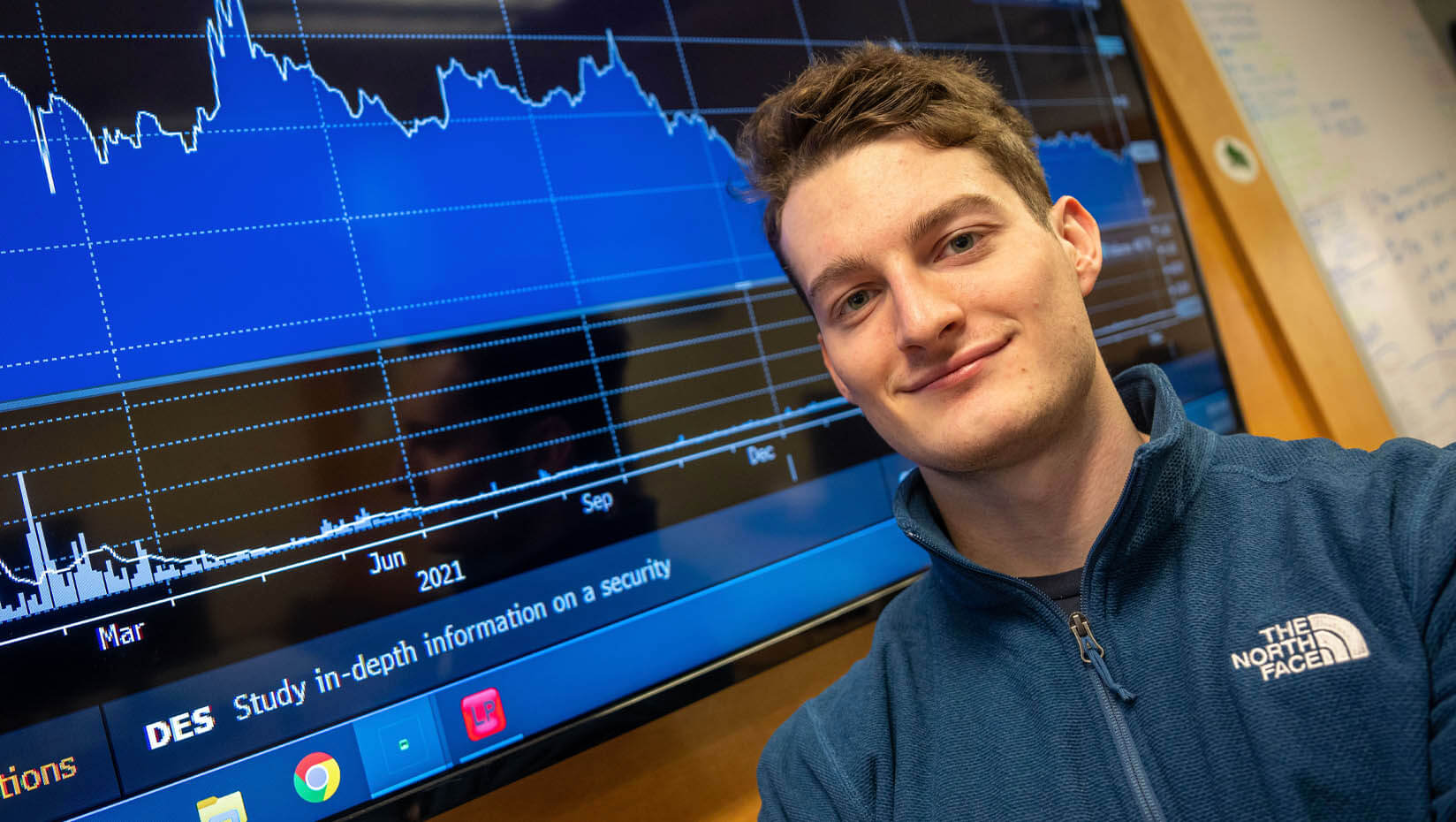
Ethan Howe: Finding Wall Street on Main Street
For Ethan Howe, investing is about more than the money: it’s about the challenge, the thrill of taking risks and the community that he has built around it. Aside from his involvement with student investment funds on campus, Howe has used his knowledge of the market to lead a UMaine team in a global competition, where they ranked in the top 5% worldwide.
Howe’s passion for finance started when he was a teenager living in Uxbridge, Massachusetts, and he realized how little financial literacy had been taught to him and his peers.
“I started doing independent research on financial literacy,” Howe says. “It’s something really important that not a lot of younger people even know about. I wanted to learn about this stuff, and I wanted to be able to teach it to others and work in a career where I can help people manage their finances.”
Howe, currently a senior majoring in finance, transferred to UMaine from University of Hartford after his freshman year. One of the elements of UMaine that convinced him to transfer was the active Student Portfolio Investment Fund, known by its members as “SPIFFY,” which manages about $3.9 million in stocks, bonds and international funds of the UMaine Endowment. Howe leads a team of three student analysts in the financials sector.
“We make all the executive decisions by a voting basis which is really exciting because it puts the power in the students’ hands,” Howe says. “We feel like we’re managing it ourselves which is a great opportunity to have as a college student before you get into the real workplace. That has been really great.”
So, when professor of finance Sebastian Lobe asked Howe and peers in his Investment Strategy class if they would represent UMaine in the 2022 Chicago Mercantile Exchange (CME) Trading Challenge — a highly realistic trading competition with 2,000 undergraduate and graduate students from more than 200 schools in 23 countries — Howe quickly took the reins.
Howe explains that investing through SPIFFY is more focused on long-term returns. With the CME Trading Challenge, he had a chance to experiment with riskier trading strategies like scalping — exploiting the small changes in share prices over the course of the day by quickly buying and selling shares in order to build profits — because there was no real money at stake.
“There are things called indicators that tell you when to buy and sell based on price activity,” Howe says. “It seems simple, but in practice it’s a lot more complex. I was testing out my indicators and trading off of those, I was finding a lot of success on a very short term basis, which is pretty cool to see. It’s valuable to me because I have an interest in the analytical side of finance, and to be able to push it to the next level, that’s something that I really found interesting.”
The risk paid off, too: Howe’s team ranked No. 22 of nearly 500 teams worldwide in the 2022 CME Trading Challenge.
“I didn’t expect it,” Howe says. “I was trading for a few hours a day and trying to keep our place as high as we could get without ruining the whole account. Stick to the formula, set your limits and follow those limits.The only successful traders are the ones that stick to their guidelines and follow the formula. That’s something that I tested and it did work for the most part.”
As a professor, Lobe was thrilled with the team’s success. He says that in class, Howe “perfectly demonstrates his understanding of finance theory in his classes and can apply investing fundamentals in real life,” which, in his experience as a professor, is “a unique combination.” Even so, Lobe says Howe’s performance in the competition was exceptional, demonstrating “an above-average trading discipline coupled with stress resistance when scalping.”
“In a highly realistic trading simulation, the team made a great return of 51% over one month. All competing teams’ average and median returns have been negative, with -13.1% and -4.3%, with no notable performance difference between undergraduate and graduate teams,” Lobe explains. “The UMaine team’s risk management was superior, as the stable performance with relatively low volatility demonstrates.”
Howe is enrolled in the MaineMBA 4+1 accelerated program and will complete his undergraduate degree in the spring.
“I hope to experience further growth in Ethan [Howe]’s intellectual endeavors that allow for future opportunities and success in academia or as a practitioner and thought leader,” Lobe says.
Howe says for now, day trading is “a little passion project,” and he still thinks he will pursue long-term investment. He was recently accepted for a wealth management internship role at Fidelity.
“I’m excited about that,” Howe says. “I feel more comfortable with long term investment just because the stress and the risk is not always there. It is very stressful to day trade — but if I got the opportunity it would be something I seriously consider working in.”
Contact: Sam Schipani, samantha.schipani@maine.edu
